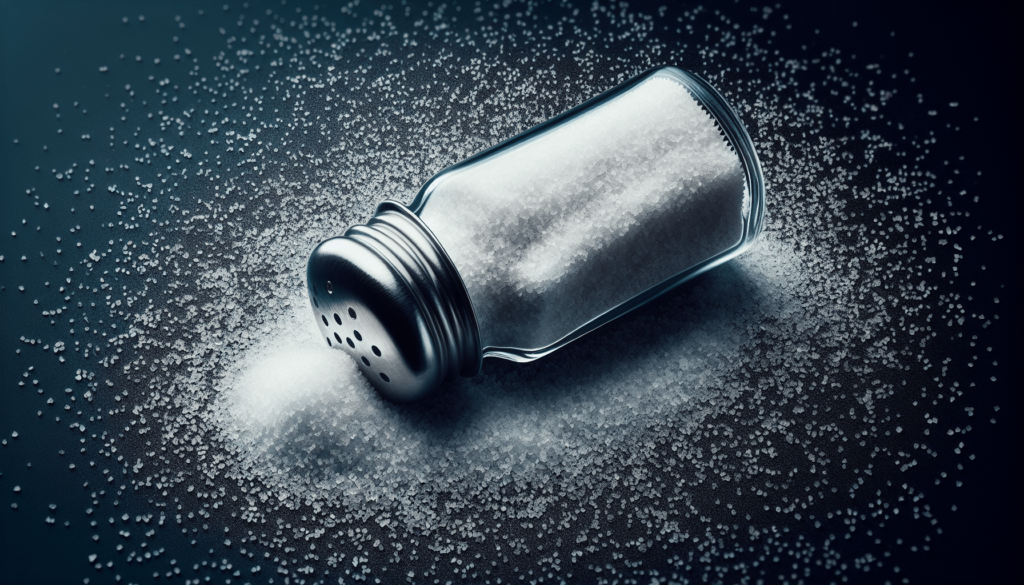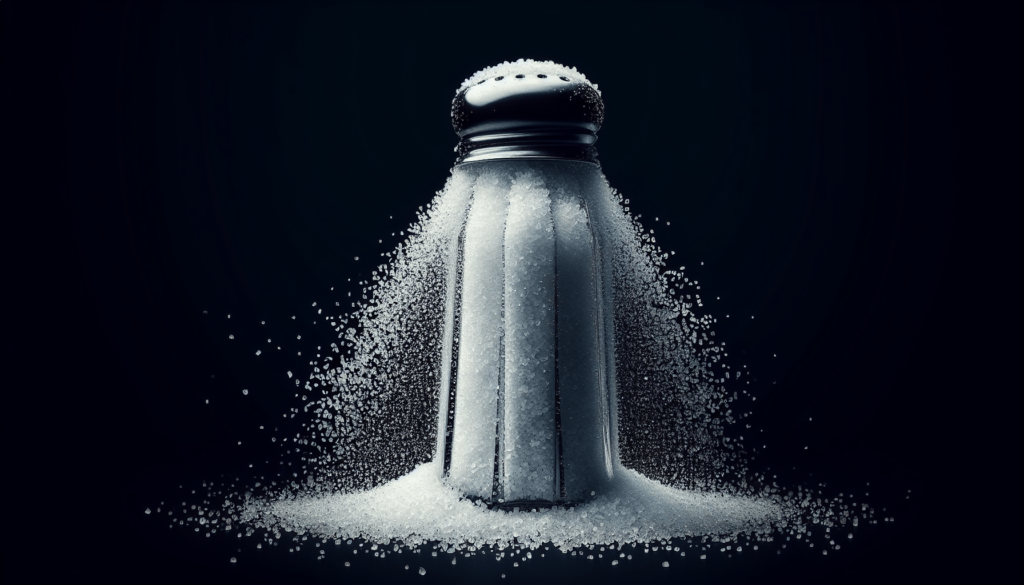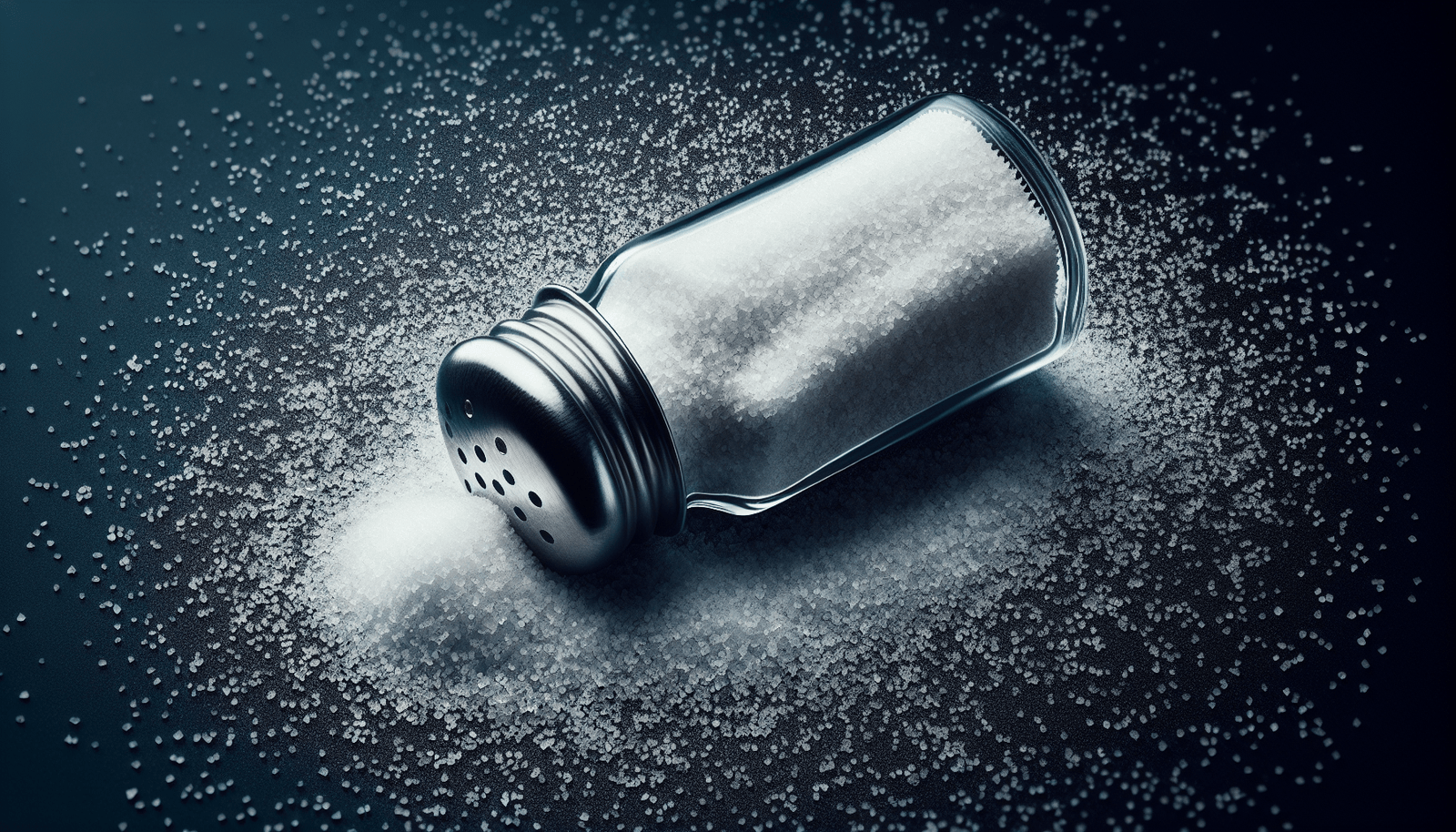Are you aware of the impact that sodium can have on your health? From enhancing the flavor of our meals to playing a vital role in maintaining the balance of bodily fluids, sodium is an essential mineral in our diets. However, it is important to understand that there can be too much of a good thing. In this article, we will explore the potential risks associated with excessive sodium consumption and provide you with practical tips to help you strike a healthy balance. So, let’s dive into the world of sodium and discover how much is too much!

What is Sodium?
Definition
Sodium is a mineral that is essential for the proper functioning of the body. It is an electrolyte and is responsible for maintaining the balance of fluids both inside and outside the body’s cells. Sodium also plays a crucial role in nerve and muscle function.
Functions in the Body
Sodium has several important functions in the body. It helps regulate blood pressure, maintain the balance of fluids in the body, and facilitate the transmission of nerve impulses. Additionally, sodium plays a role in muscle contraction and relaxation.
Recommended Sodium Intake
Daily Recommended Intake
The daily recommended intake of sodium for most healthy individuals is around 2,300 milligrams (mg) per day. However, it is important to note that this recommendation may vary depending on certain factors such as age, sex, and overall health.
Differences by Age and Health Conditions
The recommended sodium intake may differ for certain groups of people. For example, individuals over the age of 51, African Americans, and those with high blood pressure, diabetes, or chronic kidney disease are advised to restrict their daily sodium intake to 1,500 mg.
The Dangers of Excess Sodium
High Blood Pressure
Consuming excessive amounts of sodium can contribute to the development of high blood pressure, also known as hypertension. High blood pressure puts strain on the arteries and can increase the risk of heart disease and stroke.
Increased Risk of Heart Disease
Excess sodium intake has been linked to an increased risk of heart disease. High sodium levels in the body can cause the blood vessels to constrict, leading to elevated blood pressure and potential damage to the arteries and heart.
Kidney Problems
The kidneys play a crucial role in regulating sodium levels in the body. Consuming too much sodium can put a strain on the kidneys and increase the risk of kidney problems, including kidney stones and impaired kidney function.
Hidden Sodium in Foods
Processed and Packaged Foods
One of the main sources of hidden sodium in the diet is processed and packaged foods. Items such as canned soup, frozen meals, and snack foods often contain high levels of sodium to enhance flavor, extend shelf life, and prevent spoilage.
Restaurant Meals
Eating out at restaurants can also be a hidden source of excessive sodium. Many restaurant dishes are laden with salt for flavor enhancement, and portion sizes often exceed the recommended daily intake of sodium.
Condiments and Sauces
Popular condiments and sauces, such as ketchup, soy sauce, and salad dressings, can contain significant amounts of sodium. These condiments are often used in large quantities, adding up to a substantial sodium intake.

How to Reduce Sodium Intake
Read Food Labels
One of the most effective ways to reduce sodium intake is to read food labels carefully. Pay attention to the sodium content per serving and opt for products labeled as low-sodium or sodium-free whenever possible.
Cook and Prepare Meals at Home
Preparing meals at home allows you to have more control over the amount of sodium you consume. Opt for fresh ingredients and limit the use of added salt during cooking. Herbs, spices, and other flavorings can be used as alternatives to enhance taste.
Choose Lower Sodium Alternatives
When shopping, opt for low-sodium or sodium-free versions of commonly consumed products such as bread, canned vegetables, and soups. Additionally, choose fresh fruits and vegetables, lean proteins, and whole grains as part of a balanced diet.
Balancing Sodium with Other Nutrients
Potassium Intake
Balancing sodium intake with adequate potassium intake is essential for maintaining overall health. Potassium helps counteract the effects of sodium on blood pressure and is found in foods such as bananas, oranges, spinach, and potatoes.
Dietary Guidelines for Americans
The Dietary Guidelines for Americans recommend limiting sodium intake to less than 2,300 mg per day for healthy individuals. The guidelines also emphasize the importance of consuming a variety of nutrient-dense foods and managing sodium intake within the context of a balanced diet.
Sodium and Certain Health Conditions
Hypertension
Individuals with hypertension, or high blood pressure, are often advised to reduce their sodium intake. Lowering sodium consumption can help manage blood pressure levels and reduce the risk of heart disease associated with hypertension.
Heart Failure
Heart failure patients may experience fluid retention, which can be worsened by excessive sodium intake. Limiting sodium can help alleviate symptoms and reduce the strain on the heart.
Kidney Disease
Those with kidney disease may have difficulty excreting excess sodium. It is crucial for individuals with kidney disease to closely monitor their sodium intake to prevent further kidney damage and manage fluid balance.
Sodium in Different Types of Salt
Table Salt
Table salt is the most commonly used salt in households and contains sodium chloride. It is heavily processed and often contains added iodine and anti-caking agents. Consuming excessive amounts of table salt can contribute to sodium-related health issues.
Sea Salt
Sea salt is derived from evaporated seawater and contains trace minerals. While sea salt is marketed as a healthier alternative, it is still high in sodium and should be consumed in moderation.
Himalayan Pink Salt
Himalayan pink salt is a type of rock salt mined from the Punjab region of Pakistan. It is minimally processed and contains a variety of trace minerals. However, it is important to note that the mineral content is minimal and the sodium content is still high.
The Controversy over Sodium Intake
Differing Opinions
There is ongoing debate and differing opinions regarding the optimal sodium intake for overall health. Some experts argue that the current recommendations are too restrictive, while others advocate for stricter guidelines to prevent the adverse effects of excessive sodium consumption.
Effects on Health
While excessive sodium intake has been linked to various health risks, it is essential to consider individual differences and other dietary factors. Maintaining a balanced diet, in combination with regular physical activity and overall lifestyle choices, is crucial for overall health.
Conclusion
Testing Sodium Levels Regularly
To maintain optimal health, it is important to regularly check sodium levels through blood tests. This can provide insight into any potential imbalances and allow for appropriate dietary adjustments.
Making Informed Food Choices
Being aware of hidden sodium sources and making informed food choices is essential for managing sodium intake. By reading labels, cooking at home, and choosing lower sodium alternatives, you can take control of your sodium consumption and support your overall health and well-being. Remember to consult with a healthcare professional or registered dietitian for personalized advice and guidance in managing sodium intake based on your individual needs and health conditions.

